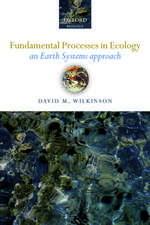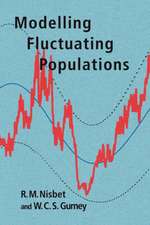Coral Bleaching: Patterns, Processes, Causes and Consequences: Ecological Studies, cartea 205
Editat de Madeleine J. H. van Oppen, Janice M. Loughen Limba Engleză Paperback – 17 noi 2010
| Toate formatele și edițiile | Preț | Express |
|---|---|---|
| Paperback (2) | 634.06 lei 38-45 zile | |
| Springer – 17 noi 2010 | 634.06 lei 38-45 zile | |
| Springer International Publishing – 25 dec 2018 | 940.87 lei 38-45 zile | |
| Hardback (2) | 641.71 lei 6-8 săpt. | |
| Springer Berlin, Heidelberg – 2 oct 2008 | 641.71 lei 6-8 săpt. | |
| Springer International Publishing – 17 iul 2018 | 962.21 lei 38-45 zile |
Din seria Ecological Studies
- 18%
 Preț: 1118.93 lei
Preț: 1118.93 lei -
 Preț: 553.72 lei
Preț: 553.72 lei - 18%
 Preț: 1680.55 lei
Preț: 1680.55 lei - 18%
 Preț: 1003.38 lei
Preț: 1003.38 lei - 20%
 Preț: 1004.71 lei
Preț: 1004.71 lei -
 Preț: 480.62 lei
Preț: 480.62 lei - 5%
 Preț: 752.26 lei
Preț: 752.26 lei - 15%
 Preț: 643.99 lei
Preț: 643.99 lei - 15%
 Preț: 644.18 lei
Preț: 644.18 lei - 15%
 Preț: 652.49 lei
Preț: 652.49 lei - 18%
 Preț: 789.83 lei
Preț: 789.83 lei -
 Preț: 382.36 lei
Preț: 382.36 lei - 15%
 Preț: 643.48 lei
Preț: 643.48 lei - 15%
 Preț: 646.30 lei
Preț: 646.30 lei - 15%
 Preț: 634.32 lei
Preț: 634.32 lei -
 Preț: 384.86 lei
Preț: 384.86 lei - 18%
 Preț: 789.98 lei
Preț: 789.98 lei - 15%
 Preț: 645.14 lei
Preț: 645.14 lei - 15%
 Preț: 649.39 lei
Preț: 649.39 lei - 18%
 Preț: 1005.43 lei
Preț: 1005.43 lei - 18%
 Preț: 949.23 lei
Preț: 949.23 lei - 15%
 Preț: 649.54 lei
Preț: 649.54 lei - 15%
 Preț: 643.34 lei
Preț: 643.34 lei - 15%
 Preț: 649.71 lei
Preț: 649.71 lei - 15%
 Preț: 638.76 lei
Preț: 638.76 lei - 18%
 Preț: 957.62 lei
Preț: 957.62 lei - 18%
 Preț: 1235.25 lei
Preț: 1235.25 lei - 18%
 Preț: 962.18 lei
Preț: 962.18 lei - 18%
 Preț: 949.23 lei
Preț: 949.23 lei - 15%
 Preț: 660.68 lei
Preț: 660.68 lei -
 Preț: 397.76 lei
Preț: 397.76 lei - 15%
 Preț: 638.24 lei
Preț: 638.24 lei - 18%
 Preț: 942.31 lei
Preț: 942.31 lei - 18%
 Preț: 1232.57 lei
Preț: 1232.57 lei - 15%
 Preț: 651.34 lei
Preț: 651.34 lei - 18%
 Preț: 952.72 lei
Preț: 952.72 lei - 18%
 Preț: 1834.27 lei
Preț: 1834.27 lei - 18%
 Preț: 1229.10 lei
Preț: 1229.10 lei -
 Preț: 423.95 lei
Preț: 423.95 lei - 18%
 Preț: 948.92 lei
Preț: 948.92 lei
Preț: 634.06 lei
Preț vechi: 834.30 lei
-24% Nou
Puncte Express: 951
Preț estimativ în valută:
121.33€ • 129.74$ • 101.16£
121.33€ • 129.74$ • 101.16£
Carte tipărită la comandă
Livrare economică 14-21 aprilie
Preluare comenzi: 021 569.72.76
Specificații
ISBN-13: 9783642089176
ISBN-10: 3642089178
Pagini: 192
Dimensiuni: 155 x 235 x 10 mm
Greutate: 0.3 kg
Ediția:Softcover reprint of hardcover 1st ed. 2009
Editura: Springer
Colecția Springer
Seria Ecological Studies
Locul publicării:Berlin, Heidelberg, Germany
ISBN-10: 3642089178
Pagini: 192
Dimensiuni: 155 x 235 x 10 mm
Greutate: 0.3 kg
Ediția:Softcover reprint of hardcover 1st ed. 2009
Editura: Springer
Colecția Springer
Seria Ecological Studies
Locul publicării:Berlin, Heidelberg, Germany
Public țintă
ResearchDescriere
One
of
the
most
dire
consequences
of
global
climate
change
for
coral
reefs
is
the
increased
frequency
and
severity
of
mass
coral
bleaching
events.
This
volume
provides
information
on
the
causes
and
consequences
of
coral
bleaching
for
coral
reef
ecosystems,
from
the
level
of
individual
colonies
to
ecosystems
and
at
different
spatial
scales,
as
well
as
a
detailed
analysis
of
how
it
can
be
detected
and
quantified.
Future
scenarios
based
on
modelling
efforts
and
the
potential
mechanisms
of
acclimatisation
and
adaptation
are
reviewed.
The
much
more
severe
coral
bleaching
events
experienced
on
Caribbean
coral
reefs
(compared
with
those
of
the
Indo-Pacific)
are
discussed,
as
are
the
differences
in
bleaching
susceptibility
and
recovery
that
have
been
observed
on
smaller
geographic
scales.
Cuprins
IntroductionJ.M.
Lough
and
M.J.H.
van
Oppen
The
Evolution
of
the
Coral-Algal
SymbiosisG.D.
Stanley
Jr
and
B.
van
de
Schootbrugge
Coral
Bleaching
in
Space
and
TimeJ.K.
Oliver,
R.
Berkelmans
and
C.M.
Eakin
Climate
Variability
and
Change:
Monitoring
Data
and
Evidence
for
Increased
Coral
Bleaching
StressC.M.
Eakin,
J.M.
Lough
and
S.F.
Heron
Detecting
and
Monitoring
Coral
Bleaching
EventsM.
Spalding
Bleaching
Resistance
and
the
Role
of
Algal
EndosymbiontsM.J.H.
van
Oppen,
A.C.
Baker,
M.A.
Coffroth
and
B.L.
Willis
Bleaching
and
Mortality
Thresholds:
How
Much
is
Too
Much?R.
Berkelmans
Consequences
of
Coral
Bleaching
for
Sessile
Reef
OrganismsT.R.
McClanahan,
E.
Weil,
J.
Cortés,
A.H.
Baird
and
M.
Ateweberhan
Coral
Bleaching
and
Consequences
for
Motile
Reef
Organisms:
Past,
Present
and
Uncertain
Future
EffectsM.S.
Pratchett,
S.K.
Wilson,
N.A.J.
Graham,
P.L.
Munday,
G.P.
Jones
and
N.V.C.
Polunin
Future
Scenarios:
a
Review
of
Modelling
Efforts
to
Predict
the
Future
of
Coral
Reefs
in
an
Era
of
Climate
ChangeS.D.
Donner,
S.F.
Heron
and
W.J.
Skirving
SynthesisM.J.H.
van
Oppen
and
J.M.
Lough
Recenzii
From
the
reviews:
"The book Coral bleaching: patterns, processes, causes and consequences, edited by Madeleine van Oppen and Janice Lough of the Australian Institute of Marine Sciences, is … a timely contribution to the coral bleaching literature. … Overall, the book is a useful addition to the library of reef ecology researchers and students. It is a small, handy, and inexpensive volume which makes it accessible to a relatively large audience. The editors provide excellent introductory and concluding chapters that summarize the work well … ." (Kenneth R. N. Anthony, Ecology, Vol. 90 (9), September, 2009)
"The book Coral bleaching: patterns, processes, causes and consequences, edited by Madeleine van Oppen and Janice Lough of the Australian Institute of Marine Sciences, is … a timely contribution to the coral bleaching literature. … Overall, the book is a useful addition to the library of reef ecology researchers and students. It is a small, handy, and inexpensive volume which makes it accessible to a relatively large audience. The editors provide excellent introductory and concluding chapters that summarize the work well … ." (Kenneth R. N. Anthony, Ecology, Vol. 90 (9), September, 2009)
Caracteristici
Brings
together
the
available
scientific
information
on
coral
bleaching
From the level of individual colonies to ecosystems
At different spatial scales
In different geographic regions
From past records to future projections
From the level of individual colonies to ecosystems
At different spatial scales
In different geographic regions
From past records to future projections
Notă biografică
Madeleine J.H. van Oppen
Australian Institute of Marine Science, PMB 3, Townsville MC, Queensland 4810, Australia and School of BioSciences, University of Melbourne, Parkville, Victoria 3010, Australia
e-mail: madeleine.van@unimelb.edu.au
J.M. Lough
Australian Institute of Marine Science, PMB 3, Townsville MC, Queensland 4810, Australia and ARC Centre of Excellence for Coral Reef Studies, James Cook University, Townsville, Queensland 4811, Australia
e-mail: j.lough@aims.gov.au
Australian Institute of Marine Science, PMB 3, Townsville MC, Queensland 4810, Australia and School of BioSciences, University of Melbourne, Parkville, Victoria 3010, Australia
e-mail: madeleine.van@unimelb.edu.au
J.M. Lough
Australian Institute of Marine Science, PMB 3, Townsville MC, Queensland 4810, Australia and ARC Centre of Excellence for Coral Reef Studies, James Cook University, Townsville, Queensland 4811, Australia
e-mail: j.lough@aims.gov.au
Textul de pe ultima copertă
One of the most serious consequences of global climate change for coral reefs is the increased frequency and severity of mass coral bleaching events and, since the first edition of this volume was published in 2009, there have been additional mass coral bleaching events. This book provides comprehensive information on the causes and consequences of coral bleaching for coral reef ecosystems, from the genes and microbes involved in the bleaching response, to individual coral colonies and whole reef systems. It presents detailed analyses of how coral bleaching can be detected and quantified and reviews future scenarios based on modeling efforts and the potential mechanisms of acclimatisation and adaptation. It also briefly discusses emerging research areas that focus on the development of innovative interventions aiming to increase coral climate resilience and restore reefs.
















